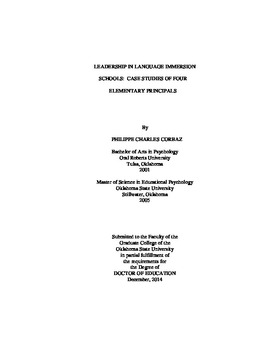| dc.contributor.advisor | Krumm, Bernita L. | |
| dc.contributor.author | Corbaz, Philippe Charles | |
| dc.date.accessioned | 2016-04-15T21:49:16Z | |
| dc.date.available | 2016-04-15T21:49:16Z | |
| dc.date.issued | 2014-12 | |
| dc.identifier.uri | https://hdl.handle.net/11244/33399 | |
| dc.description.abstract | Since 1971, foreign language immersion schools have existed in the United States, generating a robust body of literature to explicate the benefits and challenges of children learning the school curriculum through the medium of a foreign language. However, there is little knowledge about what elements contribute to effective language immersion school leadership. The purpose of this study was to examine immersion school principals' beliefs, attitudes, and dispositions on effective immersion school leadership. The assumption was that those beliefs, attitudes, and dispositions directly influence their school's achievement of the distinctive goals of immersion programs in terms of the students' learning and the teachers' practices. | |
| dc.description.abstract | The design of this research is exploratory, using a descriptive case study of four elementary school principals in immersion education, two in Spanish and two in French programs. Participants were recommended by the office of language immersion and research of the Center for Advanced Research in Language Acquisition (CARLA) as experienced immersion leaders who were successful in terms of student achievement and best practices. Data were collected through principals' interviews and direct observations of their day-to-day activities and leadership practices. The data analysis was a two-step process utilizing the software NVivo: first using an open coding design followed by Hallinger's model. | |
| dc.description.abstract | The following conclusions are based on the findings. Leadership in an immersion school is especially complex and demanding because leaders in those schools must perform all the leadership tasks common to any elementary school with the added responsibility of providing the language component. Although they described their leadership styles in collaborative terms, all four principals were strong instructional leaders in demonstrating the elements of the instructional leadership model in defining the school mission, managing the instructional programs, and promoting a positive school climate. They performed these instructional tasks in the language of instruction, either Spanish or French. Challenges include hiring and retaining quality immersion teachers, professional development for principals, the influence of the school context, and the teacher turnover rate. Characteristics involved a passion for learning languages and immersion education and the willingness to stay informed of the latest research to find practical applications. | |
| dc.format | application/pdf | |
| dc.language | en_US | |
| dc.rights | Copyright is held by the author who has granted the Oklahoma State University Library the non-exclusive right to share this material in its institutional repository. Contact Digital Library Services at lib-dls@okstate.edu or 405-744-9161 for the permission policy on the use, reproduction or distribution of this material. | |
| dc.title | Leadership in language immersion schools: Case studies of four elementary principals | |
| dc.contributor.committeeMember | Worley, Virginia A. | |
| dc.contributor.committeeMember | Sabina, Lou L. | |
| dc.contributor.committeeMember | Harris, Edward L. | |
| osu.filename | Corbaz_okstate_0664D_13826.pdf | |
| osu.accesstype | Open Access | |
| dc.type.genre | Dissertation | |
| dc.type.material | Text | |
| thesis.degree.discipline | School Administration | |
| thesis.degree.grantor | Oklahoma State University | |
